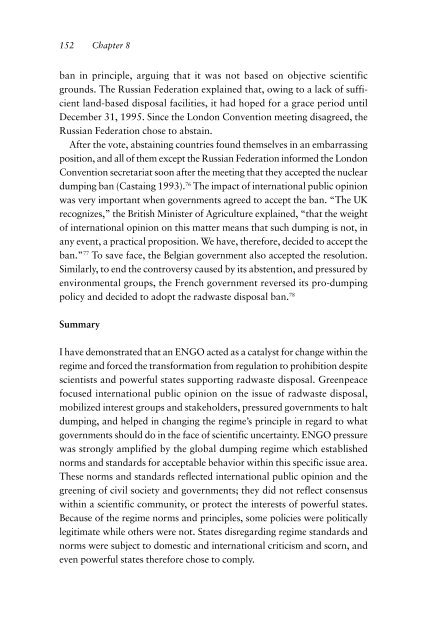Radioactive Waste Disposal at Sea: Public Ideas ... - IMO
Radioactive Waste Disposal at Sea: Public Ideas ... - IMO
Radioactive Waste Disposal at Sea: Public Ideas ... - IMO
Create successful ePaper yourself
Turn your PDF publications into a flip-book with our unique Google optimized e-Paper software.
152 Chapter 8<br />
ban in principle, arguing th<strong>at</strong> it was not based on objective scientific<br />
grounds. The Russian Feder<strong>at</strong>ion explained th<strong>at</strong>, owing to a lack of sufficient<br />
land-based disposal facilities, it had hoped for a grace period until<br />
December 31, 1995. Since the London Convention meeting disagreed, the<br />
Russian Feder<strong>at</strong>ion chose to abstain.<br />
After the vote, abstaining countries found themselves in an embarrassing<br />
position, and all of them except the Russian Feder<strong>at</strong>ion informed the London<br />
Convention secretari<strong>at</strong> soon after the meeting th<strong>at</strong> they accepted the nuclear<br />
dumping ban (Castaing 1993). 76 The impact of intern<strong>at</strong>ional public opinion<br />
was very important when governments agreed to accept the ban. “The UK<br />
recognizes,” the British Minister of Agriculture explained, “th<strong>at</strong> the weight<br />
of intern<strong>at</strong>ional opinion on this m<strong>at</strong>ter means th<strong>at</strong> such dumping is not, in<br />
any event, a practical proposition. We have, therefore, decided to accept the<br />
ban.” 77 To save face, the Belgian government also accepted the resolution.<br />
Similarly, to end the controversy caused by its abstention, and pressured by<br />
environmental groups, the French government reversed its pro-dumping<br />
policy and decided to adopt the radwaste disposal ban. 78<br />
Summary<br />
I have demonstr<strong>at</strong>ed th<strong>at</strong> an ENGO acted as a c<strong>at</strong>alyst for change within the<br />
regime and forced the transform<strong>at</strong>ion from regul<strong>at</strong>ion to prohibition despite<br />
scientists and powerful st<strong>at</strong>es supporting radwaste disposal. Greenpeace<br />
focused intern<strong>at</strong>ional public opinion on the issue of radwaste disposal,<br />
mobilized interest groups and stakeholders, pressured governments to halt<br />
dumping, and helped in changing the regime’s principle in regard to wh<strong>at</strong><br />
governments should do in the face of scientific uncertainty. ENGO pressure<br />
was strongly amplified by the global dumping regime which established<br />
norms and standards for acceptable behavior within this specific issue area.<br />
These norms and standards reflected intern<strong>at</strong>ional public opinion and the<br />
greening of civil society and governments; they did not reflect consensus<br />
within a scientific community, or protect the interests of powerful st<strong>at</strong>es.<br />
Because of the regime norms and principles, some policies were politically<br />
legitim<strong>at</strong>e while others were not. St<strong>at</strong>es disregarding regime standards and<br />
norms were subject to domestic and intern<strong>at</strong>ional criticism and scorn, and<br />
even powerful st<strong>at</strong>es therefore chose to comply.

















